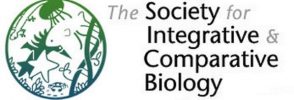Contents
- Division of Comparative Physiology and Biochemistry: Spring Newsletter 2020
- Message from the DCPB Chair, Kenneth Welch, Jr., Chair.DCPB@sicb.org
- Message from the DCPB Program Officer, Kristi Montooth, DPO.DCPB@sicb.org
- Message from the DCPB Student and Postdoctoral Affairs Committee Representative, Andrea Rummel
- Message from the DCPB Secretary, Heather Liwanag, Secretary.DCPB@sicb.org
- DCPB Chair-Elect Candidate Biographies
- DCPB Program Officer Candidate Biographies
Division of Comparative Physiology and Biochemistry: Spring Newsletter 2020
Please vote in the Spring 2020 Elections (candidate biographies can be found below). The deadline is April 19th, and the ballot can be found in the link provided here. http://burkclients.com/sicb/elections/2020.php
Message from the DCPB Chair, Kenneth Welch, Jr., Chair.DCPB@sicb.org
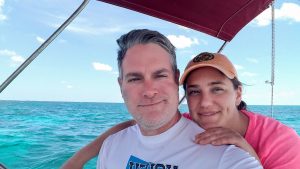
Warm greetings from the Great White North of Toronto, Ontario, Canada where, as I write this, the temperature outside is exactly 0°F (-18°C). The 2020 annual meeting in Austin was very successful, and I think fondly of the mild weather there as a preview of what’s to come further north. In total there were 2278 attendees at this year’s meeting, giving over 1800 presentations. 1069 of the attendees were students, including 2 high school students and over 350 undergraduates, about half a dozen of whom hailed from my own alma mater just down I-35 in San Antonio (Trinity University). DCPB was, as usual, strongly represented at the meeting, with about 20% of the attendees proudly displaying their DCPB affiliation on their badge.
DCPB sponsored four society-wide symposia at the Austin meeting. These highlighted a diverse suite of research areas and were all well attended. These were:
- New Frontiers in Antarctic Marine Biology, organized by James McClintock, Charles Amsler, Bill Baker, Art Woods, and Amy Moran
- Epigenetic Variation in Endocrine Systems, organized by Tyler Stevenson, Lynn Martin, and Haley Hanson
- Reproduction: the Female Perspective from an Integrative and Comparative Framework, organized by Virginia Hayssen and Teri Orr
- Building Bridges from Genome to Phenome: Molecules, Methods and Models, organized by Karen Burnett, Jonathon Stillman, Donald Mykles, and David Durica
The 2020 George Bartholomew Award lecture sponsored by DCPB was presented by Dr. Mary Caswell Stoddard, and Assistant Professor at Princeton University. Dr. Stoddard’s talk, entitled “Diversity of form and function in the colorful world of birds,” was interesting and engaging, highlighting the innovative work done by one of our society’s rising stars. It seemed many in the audience felt the same way, as Dr. Stoddard was still fielding questions from excited attendees for quite a while after the room had emptied and folks had headed to the following social. Dr. Stoddard was selected from a pool of outstanding nominees, and we eagerly anticipate another strong group of nominees in the coming year. New nominations for the George Bartholomew Award are due by August 24, 2020 and should be sent to Bart.award@sicb.org. More about the award can be found at http://sicb.org/about/constitution.php3#dcpbbylaws.
I want to thank Past-Chair of DCPB, Dr. Inna Sokolova (University of Rostock), for her years of service to DCPB and for serving as chair of the George Bartholomew Award Selection Committee. Thanks go as well to the other members of the committee for their work this past year in selecting among the many excellent candidates. And, as always, we thank John Lighton and Robin Turner of Sable Systems International for their continuing, generous support of the George Bartholomew Award.
I want to take a moment to thank Dr. Kristi Montooth (University of Nebraska) for her service as DCPB’s Program Officer (PO) and congratulate her and the rest of the SICB Program Committee for putting together an excellent program. The challenge of assembling a coherent and accessible program should not be underestimated. For example, I want to personally thank the committee for scheduling my own two students’ talks, which were appropriately each part of a different session, with a 15 minute break in between! Having time to scoot from one room to the next without missing anything meant a lot to me! Thank you, Kristi!
Thanks are due, as well, to our outgoing officers. Thank you, Dr. Kim Hammond (UC Riverside), for your diligent service as Chair these past two years, and for preparing me to take up this new role. You have been a mentor since I first visited your lab as a graduate student more than 18 years ago, through my time as a postdoc at UC Riverside, and as Chair-Elect. I look forward to your continued mentorship in your new position as DCPB’s Past-Chair! Thanks as well to Dr. Marshall McCue for his service as Divisional Secretary these past two years. We all missed seeing him at the meeting in Austin and wish him and his family well as they adjust to having just added a new family member! On that note, I want to thank Dr. Heather Liwanag (Cal Poly State University) for stepping into her role as our new Divisional Secretary a few days early to allow Marshall the chance to spend time with his new arrival. I very much look forward to working with all the members of the division executive committee, including Andrea Rummel (Brown University), who begins her third year as DCPB’s representative on the Student/Postdoctoral Affairs Committee (SPDAC)! Lastly, thanks are due to the members of the DCPB Nominations Committee: Drs. Alex Gerson (University of Massachusetts Amherst), Marshall McCue (Sable Systems International), and Caroline Williams (UC Berkeley). Thank you for your work under pressure and tight deadlines!
Message from the DCPB Program Officer, Kristi Montooth, DPO.DCPB@sicb.org
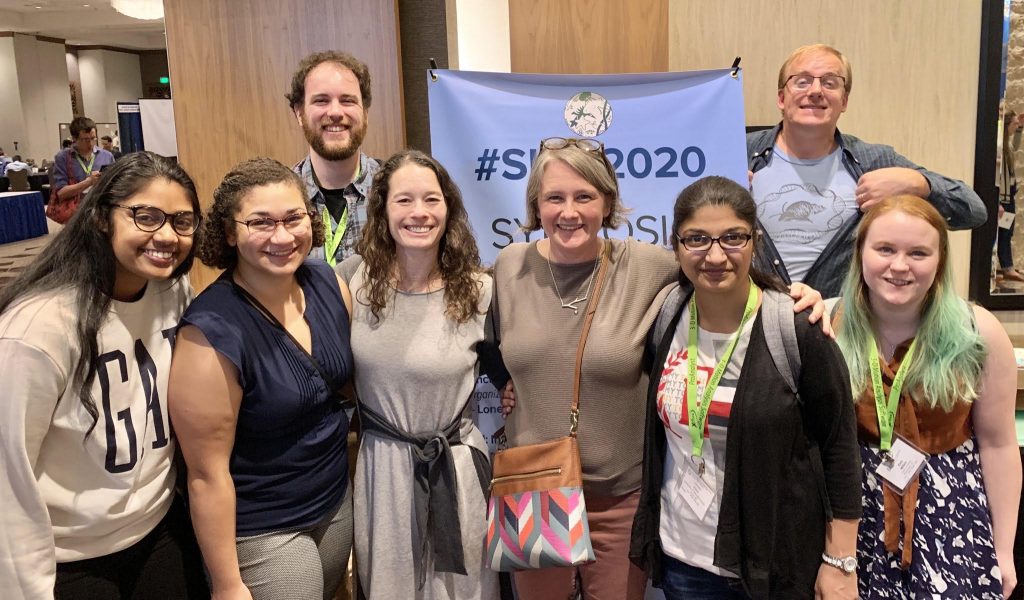
I had a fantastic time engaging with so many SICB and DCPB members and hearing about the newest in integrative research at the Austin 2020 meetings. I hope you did, too. I am struck by the growth of this meeting and the ever-increasing diversity of scientists and breadth of research. I am pictured here with a group of New Zealand mud snail (Potamopyrgus antipodarum) researchers, many of whom were first-time attendees who we hope to see again at future meetings, such as the upcoming 2021 meeting in Washington, DC, Jan 3-7.
Many of the great ideas for initiatives that make SICB and its annual meeting more inclusive and supportive come from the next generation of scientists. I would like to encourage full participation of all members in the society and in our DCPB. To our student and postdoctoral members, please take the opportunity to engage in society business, vote, and participate in symposium and workshop development. Your science, voices, and visions are the future of the society and of DCPB. You can follow our Twitter feeds @sicb_dcpb @SICB_SPDAC @SICBtweets. Please e-mail me at DPO.DCPB@sicb.org with any ideas that you may have for meeting activities that support a diverse membership and advance their scientific and professional goals.
It was great to see such fantastic research in the areas of comparative physiology and biochemistry at the meeting in Austin. There were nearly 160 abstracts presented in the area of Physiology & Biochemistry across 7 poster sessions and 12 oral sessions. Nearly half of all talks affiliated with DCPB were contributed by student members. DCPB co-sponsored four symposia that will make for great reading in this year’s issues of Integrative and Comparative Biology.
Students, don’t forget about the opportunity to participate in the “Best Student Presentation” competitions. Thank you to everyone who volunteered, chaired a session, and participated in or scored the best student presentations in Austin. Your contributions make the meetings a success!
We hope to see you in Washington, DC 2021, where DCPB will be co-sponsoring a diverse lineup of seven symposia:
- Biology Beyond the Classroom: Experiential Learning through Authentic Research, Design, and Community Engagement, organized by Alexandria Hansen, Lisa Whitenack, and Patrice Kurnath Connors
- Biology’s Best Friend: Bridging Disciplinary Gaps to Advance Canine Science, organized by Caleb Bryce and Ana Jimenez
- The Integrative Biology of Pigment Organelles, organized by Florent Figon, Jérôme Casas, and Leila Deravi
- The Biology of Sticky: Adhesive Silk, Fiber, and Glue Biomaterials across Eukaryota, organized by Karen Maruska, and Julie Butler
- Genomic Perspectives in Comparative Physiology of Mollusks: Integration across Disciplines, organized by Omera Matoo and Maurine Neiman
- Blinded by the Light: Effects of Light Pollution across Diverse Natural Systems, organized by Meredith Kernbach, Stephen M. Ferguson, Valentina Alaasam, Colleen Miller, and Clint Francis
Please feel free to contact the organizers if you are interested in presenting in the oral or posters sessions that are complementary to these symposia.
Finally, we are looking for outstanding symposium proposals for the Phoenix 2022 meetings. The symposia are a vital component of our ICB journal, and the DCPB has a history of co-sponsoring strong symposia that highlight emerging areas in integrative and comparative biology. Proposals will be due in late summer of 2020. Symposia that integrate across disciplines and include a diversity of speakers across speaker gender, background, and academic rank are more likely to gain broad support within SICB and with funding agencies such as NSF.
Student and postdoc members, you are the future of integrative and comparative biology, and we encourage you to take part in organizing a symposium or workshop; it is a great opportunity for professional and scientific development. Feel free to contact me at the e-mail address above or SICB Program Officer Jake Socha (programofficer@sicb.org) with ideas for symposia or with questions. I am happy to brainstorm ideas, facilitate collaborative symposium development, and provide past successful proposal examples to help in your proposal development and in obtaining external funding to help support the attendance of your speakers.
Finally, I encourage you to submit your research findings to the fully open-access SICB society journal Integrative Organismal Biology. SICB members receive a significant discount for publication charges, making this one of the most reasonable open-access publishing options available!
Special Session in Honor of George Gilchrist at SICB 2021, organized by Martha Muñoz and Cameron Ghalambor
Dear DCPB Members,
We are writing to invite you to a Special Session in honor of George Gilchrist at SICB 2021 in Washington, DC. George has left an indelible mark on our community and we would like to celebrate his life and legacy.
We are also looking for speakers who are interested in contributing to the session. If you’d like to give a talk that celebrates George in any way, please feel free to e-mail us (martha.munoz@yale.edu and Cameron.ghalambor@colostate.edu). Also, please feel free to share this information with other you think would be interested in the session.
Although this is a somber time, we hope this special session provides an opportunity for us to celebrate the many ways that George has made a positive impact in our lives.
Best, Martha and Cam
Message from the DCPB Student and Postdoctoral Affairs Committee Representative, Andrea Rummel
The Student and Postdoctoral Affairs Committee (SPDAC) had a great time at the Austin 2020 meeting, facilitating a workshop, Transitions in Science, and interacting with folks at our booth during the poster sessions. Now, SPDAC is looking towards the 2021 meeting in DC. We are planning a workshop, a panel followed by roundtable discussions, focusing on the theme “Transferrable skills in academia and non-academia.” We plan to invite experts inside and outside academia, taking advantage of SICB’s membership and DC’s unique ecosystem of governmental and policy organizations, NGOs, and museums. Stay tuned for more information as SICB 2021 approaches!
We’ll again be hosting the SPDAC booth during the poster sessions, staffed with SPDAC committee members and other experts to distribute brochures and answer questions on different themes, like finding a postdoc; science communication; writing research, teaching, and diversity statements; and more. If you have ideas for discussion or content for either of these events that you’d like to see included, or any other suggestions, contact me via e-mail (andrea_rummel@brown.edu) or the DCPB or SPDAC Twitter accounts (@SICB_DCPB and @SICB_SPDAC). Don’t forget to take advantage of Charlotte Magnum Support for housing at the next meeting, apply for SICB Grants in Aid of Research, and check out other resources for support (many listed here for members: http://www.sicb.org/grants/externalgrants.php). See you in DC!
Message from the DCPB Secretary, Heather Liwanag, Secretary.DCPB@sicb.org
Hi there, DCPB! We have some great things going on, and there are certainly even more great things our members may want to share with the division. If there is any news you would like to share with the DCPB membership, including job ads, postdoctoral positions, and opportunities for students, please feel free to contact me at Secretary.DCPB@sicb.org. If you would like to see your research highlighted on the SICB website in our Researchers Database, please send me a research picture, a title for the picture/research, and a brief (1-3 sentences) description of your research via e-mail. Examples can be found at http://sicb.org/divisions/DCPB/researchers.php3.
Elections for divisional Chair-Elect and divisional Program Officer will take place later this spring. We have two fantastic candidates for Chair-Elect, Dr. Jon Harrison and Dr. Jonathon Stillman, and two excellent candidates for Program Officer, Dr. Zac Cheviron and Dr. Mike Sears. Ballots will be issued in March, so keep an eye out for the SICB Election e-mail and please vote! On behalf of the DCPB, I give my sincere thanks to these outstanding candidates for their willingness to serve our division.
Thanks to all of our members for your continued support of the DCPB. I look forward to seeing all of you in Washington, DC!
DCPB Chair-Elect Candidate Biographies
(Ballot: http://burkclients.com/sicb/elections/2020.php)
Jon Harrison

Current Position: Professor, School of Life Sciences, Arizona State University
Education: B.Sc., University of Toronto (1978); Ph.D., Univ. of Colorado, Boulder (1987); Postdoctoral Fellow, Department of Zoology, University of British Columbia (1988-1990)
Professional Experience: Assistant Professor, Department of Zoology, Arizona State University (1991-1997); Associate Professor, Department of Biology, Arizona State University (1997-2002); Professor, School of Life Sciences, Arizona State University (2002-present); Associate Director of Facilities, School of Life Sciences, Arizona State University (2005-2009); Institutional Official for animal Care, Arizona State University (2011-2013); University Research Integrity Officer, Arizona State University (2011-2013); Director of Research Infrastructure & Facilities, Office of Knowledge Enterprise Development, Arizona State University (2010-2013); Assistant Vice-President, Research Infrastructure & Facilities, Office of Knowledge Enterprise Development, Arizona State University (2012-2013)
SICB Activities: Nominating Committee – DCPB (1990-1991); Symposium Co-Organizer (with J.E. Phillips), “Insect Acid-Base Regulation” (1992); Symposium Organizer, “Responses of terrestrial invertebrates to variation in temperature and water availability: molecular, organismal, and evolutionary approaches” (1996); Editorial Board, Physiological and Biochemical Zoology (2000-present); Program Officer – DCPB (2000-2003); Symposium Co-Organizer (with R. Sterner), Cross-Society Symposium “Integrated research challenges: Biological stoichiometry from genes to ecosystems” (2003); Society Program Officer (2011-2013); Symposium Co-Organizer (with Sherry Tamone), “Physiology of the Pancrustaceae” (2015)
Other Memberships: American Physiological Society, Entomological Society of America, International Union for the Study of Social Insects
Research Interests: Respiratory physiology: evolution and mechanisms; Metabolic and nutritional physiology: evolution and mechanisms; Effects of body size (scaling): evolution and mechanisms; Social insect physiology and behavior; Effects of environmental change on coupled human and natural systems, including climate, agricultural practices and environmental toxicology
Goals Statement: SICB has been my favorite society since I became a member in 1982 due to its focus on organism-environment interactions and the professional development of its members. If elected, my major goals as DCPB chair will be to work 1) to engage members in the division and society by reaching out to members personally and by surveying and implementing suggestions, 2) with members and the program officers to ensure strong symposia and workshops of interest to the division, 3) to enhance the experience of participants in best student presentation activities by improving feedback, and 4) with the other society officers to continue to improve and develop programs that aid the professional development of our trainees.
Jonathon Stillman
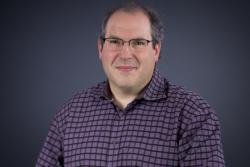
Current Positions: Professor, Department of Biology, San Francisco State University; Associate Adjunct Professor, Department of Integrative Biology, University of California Berkeley; Guest Professor, University of Basel, Switzerland
Education: B.S., University of Minnesota (1991); Ph.D., Oregon State University (1998); Postdoctoral Fellow, Johns Hopkins University (1999-2000); Postdoctoral Fellow, Hopkins Marine Station, Stanford University (2001-2003)
Professional Experience: Visiting Professor, Biology, Occidental College (2001-2002); Assistant Professor, Zoology, University of Hawaii at Manoa (2003-2005); Assistant / Associate Professor, Romberg Tiburon Center and Department of Biology, San Francisco State University (2005-2014); Assistant Adjunct Professor, Department of Integrative Biology, University of California Berkeley (2009-2016); Editorial Appointments: Integrative and Comparative Biology (2016-2017), Marine Biology (2015-2017), Physiological and Biochemical Zoology (2012-2020); active reviewer for many journals and funding agencies; frequent panelist for National Science Foundation (BIO IOS, GEO BIO-OCE)
SICB Activities: Member since 1990; Attendee since 1987 (not every year); Secretary – DCPB (2006-2007); Program Officer – DCPB (2013-2014); Co-author of two Grand Challenges in Organismal Biology manuscripts (2010, 2011); Organized/co-organized five symposia and two workshops.
Research Interests: Environmental and comparative physiology of marine and freshwater organisms, multiple stressors, integrative ecophysiology, responses to environmental change.
Goals Statement: Since 1987, when I attended my first ASZ meeting as a freshman undergraduate, SICB has been an important mainstay of my professional career. The strengths of SICB as a broad and student-postdoc friendly meeting that draws notable mid-career and senior researchers are important to maintain. As DCPB Chair-Elect I will work towards ensuring that the SICB annual meetings remain a core high-priority meeting for comparative physiologists by encouraging the development of programs at the cutting edge of comparative physiology. In particular, retaining the young and diverse scientists who have recently joined SICB, and developing stronger linkages between DCPB and other physiological societies (e.g., APS Comparative Section, SEB) are important goals. I will encourage development of interdivisional symposia reflecting the multi-disciplinary nature of comparative physiology, which meet the Grand Challenges in Organismal Biology that SICB members have outlined, and which promote fruitful future directions for helping comparative physiologists make significant progress in fundamental aspects of our research, education, and outreach efforts. Finally, I will work with SICB Executive Committee members to promote DCPB’s efforts in development, diversity, and dialog with journalists to ensure that DCPB remains strongly poised into the future.
DCPB Program Officer Candidate Biographies
(Ballot: http://burkclients.com/sicb/elections/2020.php)
Zachary Cheviron
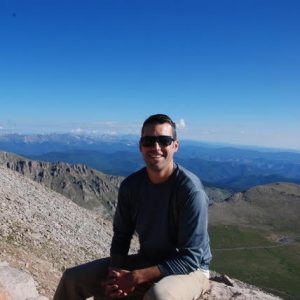
Current Position: Associate Professor, Division of Biological Sciences, University of Montana
Education: B.S., University of Evansville (2000); M.S., Illinois State University (2003); Ph.D., Louisiana State University (2008)
Professional Experience: Postdoctoral Fellow, University of California, Los Angeles (2009-2010); Postdoctoral Fellow, University of Nebraska, Lincoln (2010-2012); Assistant Professor, University of Illinois, Urbana-Champaign (2012-2015); Assistant Professor, University of Montana (2015-2019); Associate Professor, University of Montana (2019-present)
SICB Activities: Member since 2008 (DEE & DCPB); Author/co-author on >20 presentations at SICB meetings; Invited speaker at SICB symposium on Evolutionary Impacts of Seasonality (2017).
Other Memberships: Society for the Study of Evolution, American Ornithological Society
Research Interests: Research in my lab focuses on addressing questions at the interface of integrative physiology, functional genomics, and evolutionary biology. These questions range from mechanistic investigations of physiological adaptation and acclimatization responses to comparative analyses of the importance of environmental gradients in population divergence, and speciation. We work primarily with birds and mammals that are distributed across broad elevational, latitudinal, and salinity gradients using integrative approaches that draw on techniques from functional genomics to physiological ecology.
Goals Statement: The SICB meeting is always a highlight of my winter. It is hard to overstate the impact that the annual meetings had on my own professional development as a student and postdoc, and I am incredibly excited about the opportunity to give back to the society. As a DCPB Program Officer, I would have three primary goals. First would be to build interaction among DCPB and other SICB divisions by sponsoring forward-looking symposia that explore interfaces between traditional SICB disciplines and those of other SICB divisions. Second, I would work to grow and diversify division participation in the annual meeting. Previous program officers have made great strides to make the meeting more accessible to more people. The free child care program at last year’s meeting in Austin is a fantastic example of these efforts, but I think we can do more. Finally, I would work to increase the online content associated with the meeting for those who can’t attend in person. These efforts would simultaneously increase the reach and accessibility of our annual meeting.
Mike Sears
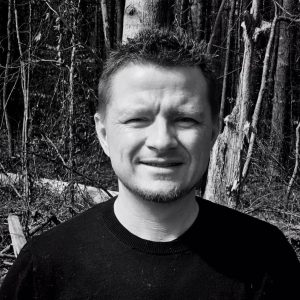
Current position: Associate Professor, Department of Biological Sciences, Clemson University (2012-present)
Education: Ph.D, Biology, University of Pennsylvania (2001); B.S. Biology, Rhodes College (1993)
Professional experience: Postdocs at Indiana State University (2002-2004) and University of Nevada Reno (2004-2005); Assistant Professorships at Southern Illinois University, Carbondale (2006-2009) and Bryn Mawr College (2009-2012).
SICB Activities: Member since 1999; Editorial Board, Integrative and Comparative Biology (2012-2017); Chair, Division f Ecology and Evolution (2015-2017); Divisional Program Officer, Division of Ecology and Evolution (2009-2012); Symposium organizer (2004, 2011, 2016). Co-creator and regular participant of Beer and Brains.
Other Memberships: Sigma Xi, Ecological Society of America
Research Interests: Physiological ecology, thermal adaptation, thermoregulation, organismal responses to climate
Goals statement: SICB was the first professional conference that I attended as an undergraduate and it will likely be the last conference that I will attend before I die. I have been happy to call SICB my professional home during all the times in between. One of the goals throughout my service to the society has been to promote the work of graduate students, postdocs, and early career scientists, while also promoting diversity and inclusion. In that respect, my goals for the division would not change, and as Program Officer, I will be committed to developing symposia, workshops, and mentoring programs with those values in mind. These activities are some of the most important items that our society does as they help to promote the careers of our membership across all levels. That said, I will also look for new opportunities to prepare our membership for an ever changing academic landscape. This includes finding opportunities to engage midcareer researchers to contribute to our program, as their particiation sometimes seems to decrease as they take on many roles at this career stage and in their personal lives. I look forward to taking on these responsibilities and to work actively with our membership to further the missions of the division and the society.
